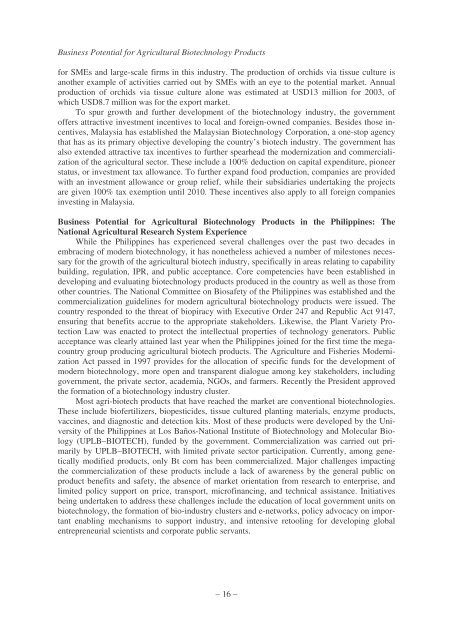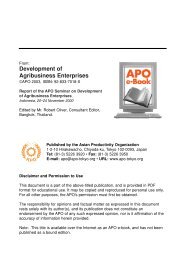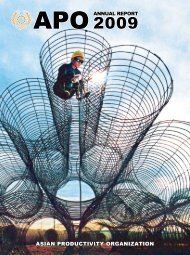Business Potential for Agricultural Biotechnology - Asian Productivity ...
Business Potential for Agricultural Biotechnology - Asian Productivity ...
Business Potential for Agricultural Biotechnology - Asian Productivity ...
You also want an ePaper? Increase the reach of your titles
YUMPU automatically turns print PDFs into web optimized ePapers that Google loves.
<strong>Business</strong> <strong>Potential</strong> <strong>for</strong> <strong>Agricultural</strong> <strong>Biotechnology</strong> Products<br />
<strong>for</strong> SMEs and large-scale firms in this industry. The production of orchids via tissue culture is<br />
another example of activities carried out by SMEs with an eye to the potential market. Annual<br />
production of orchids via tissue culture alone was estimated at USD13 million <strong>for</strong> 2003, of<br />
which USD8.7 million was <strong>for</strong> the export market.<br />
To spur growth and further development of the biotechnology industry, the government<br />
offers attractive investment incentives to local and <strong>for</strong>eign-owned companies. Besides those incentives,<br />
Malaysia has established the Malaysian <strong>Biotechnology</strong> Corporation, a one-stop agency<br />
that has as its primary objective developing the country’s biotech industry. The government has<br />
also extended attractive tax incentives to further spearhead the modernization and commercialization<br />
of the agricultural sector. These include a 100% deduction on capital expenditure, pioneer<br />
status, or investment tax allowance. To further expand food production, companies are provided<br />
with an investment allowance or group relief, while their subsidiaries undertaking the projects<br />
are given 100% tax exemption until 2010. These incentives also apply to all <strong>for</strong>eign companies<br />
investing in Malaysia.<br />
<strong>Business</strong> <strong>Potential</strong> <strong>for</strong> <strong>Agricultural</strong> <strong>Biotechnology</strong> Products in the Philippines: The<br />
National <strong>Agricultural</strong> Research System Experience<br />
While the Philippines has experienced several challenges over the past two decades in<br />
embracing of modern biotechnology, it has nonetheless achieved a number of milestones necessary<br />
<strong>for</strong> the growth of the agricultural biotech industry, specifically in areas relating to capability<br />
building, regulation, IPR, and public acceptance. Core competencies have been established in<br />
developing and evaluating biotechnology products produced in the country as well as those from<br />
other countries. The National Committee on Biosafety of the Philippines was established and the<br />
commercialization guidelines <strong>for</strong> modern agricultural biotechnology products were issued. The<br />
country responded to the threat of biopiracy with Executive Order 247 and Republic Act 9147,<br />
ensuring that benefits accrue to the appropriate stakeholders. Likewise, the Plant Variety Protection<br />
Law was enacted to protect the intellectual properties of technology generators. Public<br />
acceptance was clearly attained last year when the Philippines joined <strong>for</strong> the first time the megacountry<br />
group producing agricultural biotech products. The Agriculture and Fisheries Modernization<br />
Act passed in 1997 provides <strong>for</strong> the allocation of specific funds <strong>for</strong> the development of<br />
modern biotechnology, more open and transparent dialogue among key stakeholders, including<br />
government, the private sector, academia, NGOs, and farmers. Recently the President approved<br />
the <strong>for</strong>mation of a biotechnology industry cluster.<br />
Most agri-biotech products that have reached the market are conventional biotechnologies.<br />
These include biofertilizers, biopesticides, tissue cultured planting materials, enzyme products,<br />
vaccines, and diagnostic and detection kits. Most of these products were developed by the University<br />
of the Philippines at Los Baños-National Institute of <strong>Biotechnology</strong> and Molecular Biology<br />
(UPLB–BIOTECH), funded by the government. Commercialization was carried out primarily<br />
by UPLB–BIOTECH, with limited private sector participation. Currently, among genetically<br />
modified products, only Bt corn has been commercialized. Major challenges impacting<br />
the commercialization of these products include a lack of awareness by the general public on<br />
product benefits and safety, the absence of market orientation from research to enterprise, and<br />
limited policy support on price, transport, microfinancing, and technical assistance. Initiatives<br />
being undertaken to address these challenges include the education of local government units on<br />
biotechnology, the <strong>for</strong>mation of bio-industry clusters and e-networks, policy advocacy on important<br />
enabling mechanisms to support industry, and intensive retooling <strong>for</strong> developing global<br />
entrepreneurial scientists and corporate public servants.<br />
– 16 –
















